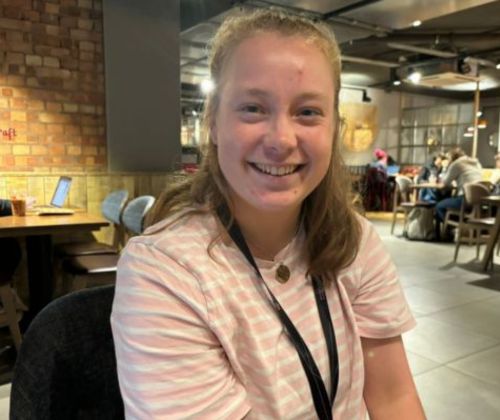PhD student talks Neurodiversity diagnosis as an adult

PhD student, Kirsty Brown, was first diagnosed by Forward Thinking Birmingham’s 18-25 service with Attention Deficit Hyperactivity Disorder (ADHD) in her final year of her undergraduate degree at age 21. Later, she was also diagnosed with Autism and OCD (Obsessive Compulsive Disorder).
Kirsty and her ADHD Specialist Psychiatrist, Dr Sangeeta Ambegaokar (Dr Sang) spoke to us about the stigmas of ADHD, coming to terms with the diagnosis and day-to-day life with the condition.
ADHD is a condition that affects people's thoughts, feelings and behaviour. People with ADHD can seem restless, may have trouble concentrating and may act on impulse.
Kirsty, 25, who studies at the University of Birmingham, said: “I was a little bit reluctant to go ahead with getting the ADHD diagnosis. A few friends suggested it whilst I was at university doing my undergraduate degree, but I was just like, oh well. And they suggested I do some questionnaires, and that is how it came about.
“There is quite a big stigma around being female and high achieving whilst also being neurodiverse. I have always been fine in school and university. I play sports. I think saying to people ‘oh I think I might have it’ and people questioning it made me question it all bit more.
“It just makes you think back on your whole life and what it would have been like if my ADHD was picked up when I was younger that was why it was difficult. I was not a particularly easy child at home because I was quite dysregulated. I tried to mask and copy from other people how to be.”
Dr Sang said: “People underestimate the emotional impact of masking and how mentally tiring it is to always be this way, even though you might not consciously feel that you are masking due to this behaviour having been learnt over a number of years. Whether conscious or not, masking is extremely emotionally draining and long periods of sustained masking can ultimately lead to burnout.
“Women with ADHD who are very academically bright and high achieving but constantly masking to try and fit in socially tend to put themselves under considerable pressure and are a group at particular risk of burnout.”
Kirsty said: “I have a bit of a problem with society’s idea of Hyperfocus being a superpower. I do not think of it to that extreme for me personally. Hyperfocus can come about when it’s something of a special interest.”
Dr Sang said: “Hyperfocus is something that can get in the way for people with ADHD and take them down a rabbit hole away from what they should be doing.”
Kirsty said: “There are benefits to having ADHD but it still has its challenges. Medication really helps without me necessarily realising. I did have a struggle where I came off my meds and had to go back on to them. I now find my meds very helpful for emotional regulation after working with Dr Sang to find the right medication and dose that supports me.
“In the last six months, I have properly accepted myself and things like accommodations to enable me to be better. I am lucky to be around really accepting people.”
Katie Boutros, specialist ADHD nurse said: “Awareness is so important, particularly now, because I think for a long time it was very misunderstood as to what ADHD was so often, even professionally, it was thought of as something that you grow out of when you hit a certain age. It was thought it was more common in boys.
“Those are the kind of misconceptions about ADHD, but we are learning now that there is a massive, missed generation of young people who do not present in those stereotypical ways.
“We're learning so much more about females of ADHD and how their presentation might be completely different to what schools are looking out for. We are seeing 18 plus females more often because these are the people who have been missed in school because they present so differently. So being able to get that awareness out there to try and break down some of those ideas about ADHD is important and can give people answers as to why they are the way they are, that way they can seek support.”
For ADHD Awareness Month, we also spoke to Forward Thinking Birmingham’s Nicki Twigg to learn more about the condition. Check out the story here.

